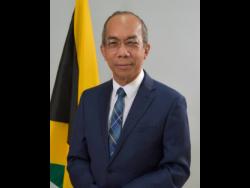Horace Chang | A balanced approach to unexplained wealth orders in Jamaica | In Focus
There has been much public discourse regarding the proposal for Unexplained Wealth Orders (UWOs) to be incorporated into Jamaica’s legislative framework, with proponents touting it as a potential panacea for all ills. In the interest of furthering the debate in a measured and balanced manner, I wish to highlight several factors which, in fairness to the discourse, need to be fully ventilated.
Some jurisdictions that have introduced UWOs include Australia, Kenya, Mauritius, Zimbabwe, the United Kingdom, and Trinidad & Tobago. Essentially, a UWO is a civil court order that can assist authorities in investigating or confiscating assets that are determined to be disproportionate to a person’s known sources of income.
UWO processes are generally triggered when law enforcement demonstrates to a court a manifest discrepancy between legitimate earnings, evidenced, for example, by tax statements or income declarations, and the assets owned by the individual, whether directly or beneficially. Once that discrepancy is demonstrated, the burden shifts to the individual to prove the legal origin of the assets. The consequences of failing to do so vary depending on the legal provisions adopted by the jurisdiction, which, in turn, are influenced by the policy objectives of the UWO regime.
UWOs are most effective where there is no clear link between the property and unlawful conduct, yet the respondent holds assets that cannot be explained by known income or employment. As such, they are useful investigative tools designed to assist agencies in gathering critical evidence at the outset of an investigation, where they may otherwise be unable to do so. Further, UWOs are generally intended for exceptional and complex cases.
NOTABLE DIFFERENCES
Examining the experience of other jurisdictions, there are notable differences in how UWOs are applied. In the UK, for instance, UWOs serve as an investigative tool rather than an asset-recovery mechanism in their own right. Civil confiscation can only occur through non-conviction-based confiscation mechanisms, and information obtained via a UWO can only be used in civil recovery proceedings. It is also noteworthy that the UWO regime in the UK has been sparingly used, primarily targeting Politically Exposed Persons (PEPs) and high-value individuals. Importantly, the UK has engaged in significant reforms since implementing UWOs, underscoring the need for other jurisdictions such as Jamaica to carefully consider both the mechanics of the proposed system and its compatibility with existing tools and law-enforcement measures.
The standards of proof also vary across jurisdictions, ranging from a “balance of probabilities” to “reasonable suspicion” of involvement in criminal activity. Some jurisdictions empower certain authorities not only to compel the production of information, but also give courts the ability to confiscate any wealth that is not explained to the satisfaction of the courts. Therefore, any move towards adopting a UWO regime in Jamaica must involve careful consideration of the legal and constitutional framework in which it will operate.
Notably, in Jamaica, the Charter of Fundamental Rights & Freedoms has further entrenched the fundamental rights of citizens, thereby, raising the threshold for the State and state actors to satisfy in circumstances, where there will be interference with those rights. The State recognises the rights provided by the charter, particularly the right to privacy, property protection, and right of person against self-incrimination. As a result, the successful implementation of UWOs in Jamaica will require a comprehensive approach that carefully balances a “reasonable suspicion of involvement in criminality” with the constitutional rights of citizens. The point must be made that depending on the policy direction taken regarding this proposed regime, the challenges to be hurdled in the context of the charter will potentially be greater, depending on the nature of and the manner in which particular rights will be infringed.
EXAMINING MODELS
Currently, efforts are under way examining models being utilised in jurisdictions with codified constitutions, doing the necessary scoping and assessment of the mechanics relevant to the incorporation of UWOs in our asset recovery regime. Even in jurisdictions where the regime is established, challenges in superior courts are to be expected and are to be welcomed as one way in which the jurisdiction in this regard can be developed. In Trinidad & Tobago, for example, the recent ruling by the Court of Appeal to grant a Preliminary UWO, which initially, had been set aside, will be appealed in the Judicial Committee of the Privy Council.
It is essential to recognise that the absence of UWOs to date has not diminished the effectiveness of Jamaica’s law-enforcement agencies. While UWOs would further augment the existing practices in combating money laundering, it is imperative that they align with our legislative and constitutional framework. Ultimately, the most critical aim is to ensure that Jamaica has law-enforcement institutions that are not only independent, but also competent and professional.
The combined resources of the Financial Investigations Division (FID), the Major Organised Crime and Anti-Corruption Agency (MOCA), the Counter-Terrorism and Organised Crime Investigation Branch (C-TOC), and other law-enforcement institutions are already among the finest in the developing world at investigating money laundering and serious financial crimes. This government has been instrumental in financing and supporting this ecosystem without seeking to exert any influence whether directly or through budgetary restrictions.
And so, while Unexplained Wealth Orders may offer an additional tool in the fight against the illicit accumulation of wealth, their implementation in Jamaica must be carefully calibrated to respect constitutional safeguards and human rights as expressed in our Charter of Rights. The ultimate goal should be to ensure that law-enforcement institutions are properly resourced and empowered to effectively use the various legislative tools already available and which are quite strong. A well-considered, balanced approach will ensure that any new measures introduced serve the best interests of the nation.
Dr Horace Chang is Jamaica’s deputy prime minister and minister of national security. He is also the member of parliament for North West St James. Send feedback to securityminister@mns.gov.jm.

